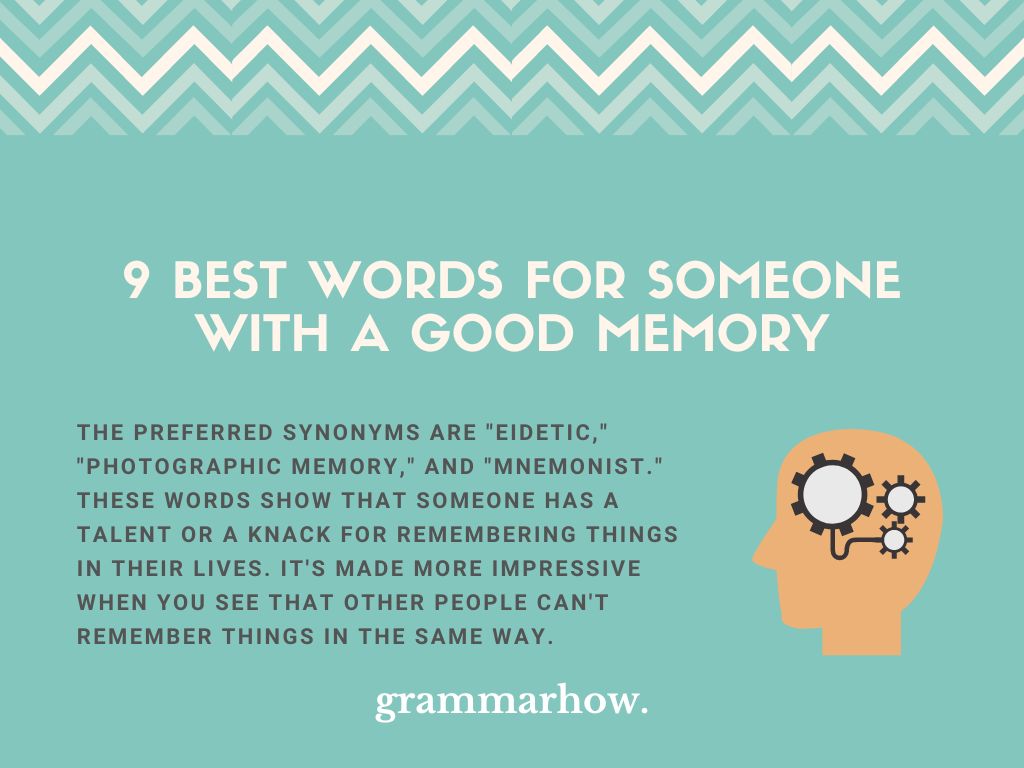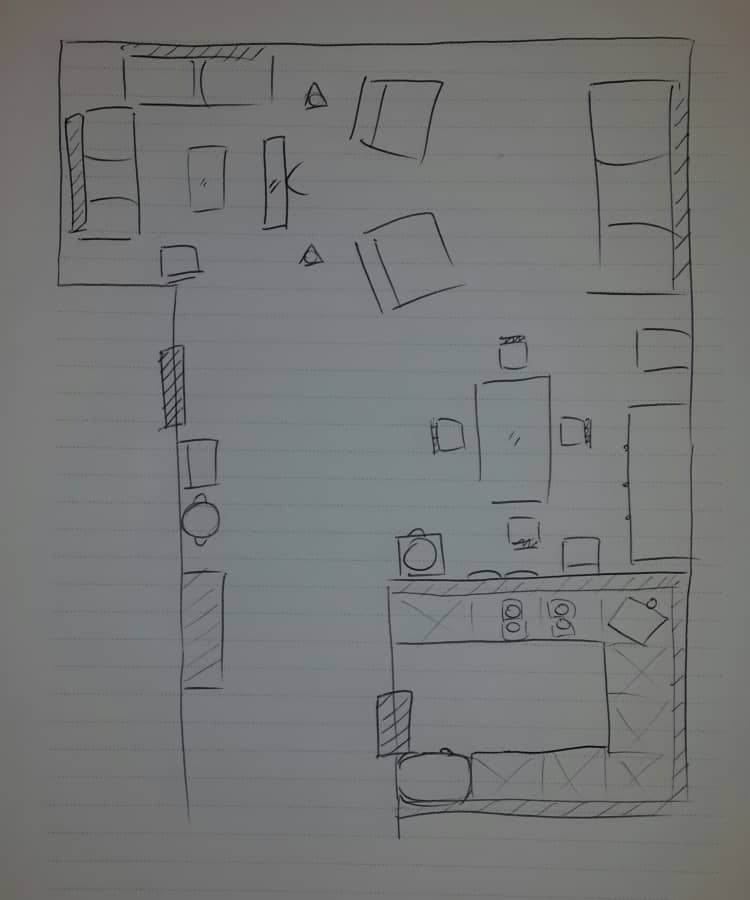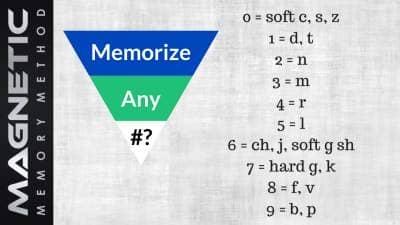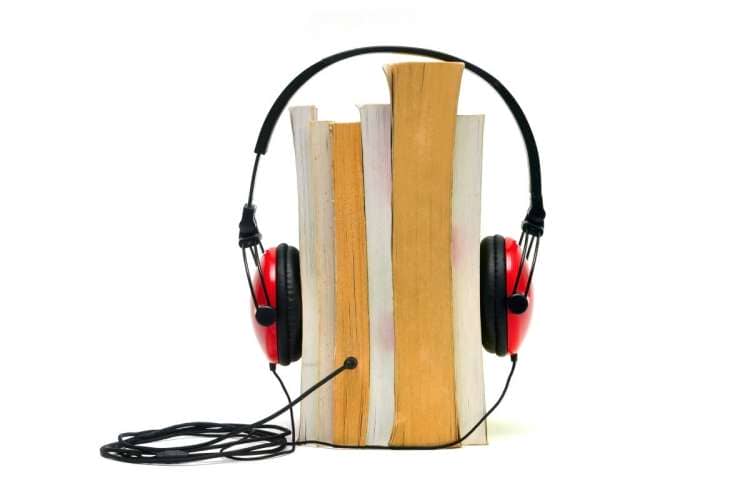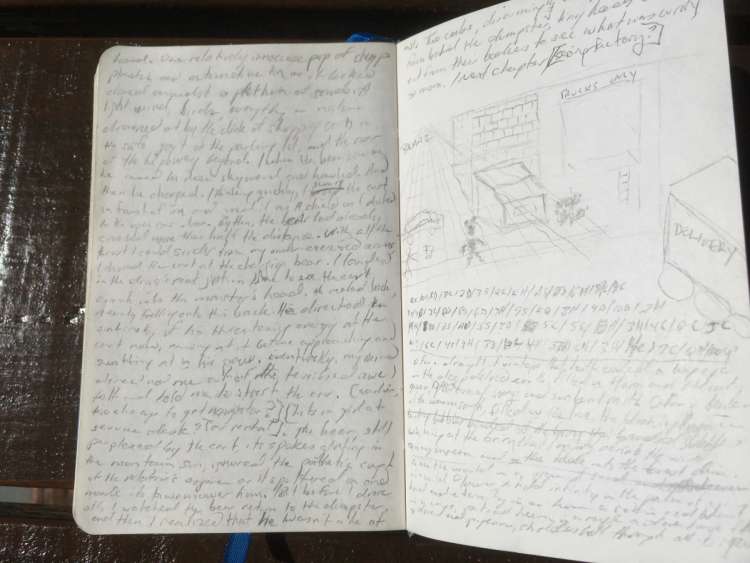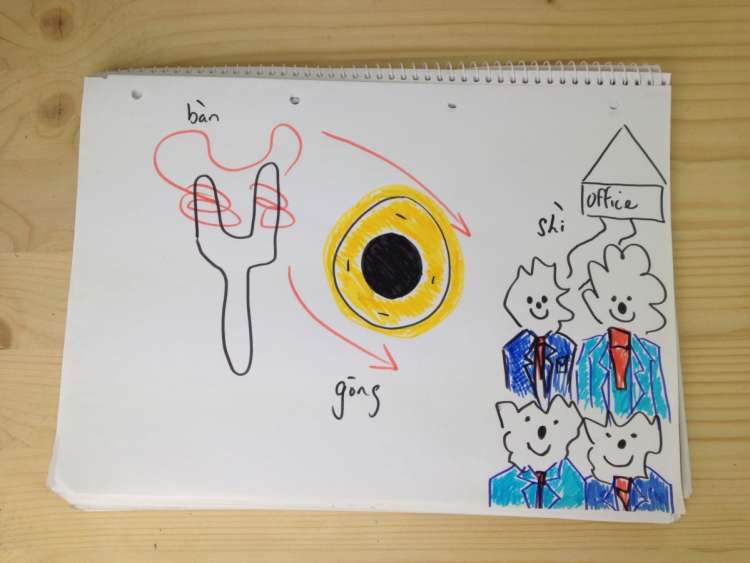When someone has a good memory, you might want to come up with a good word to describe them. Unfortunately, there aren’t too many suitable choices out there. Still, this article will explore some of the best options available to you.
The preferred synonyms are “eidetic,” “photographic memory,” and “mnemonist.” These words show that someone has a talent or a knack for remembering things in their lives. It’s made more impressive when you see that other people can’t remember things in the same way.
Eidetic
“Eidetic” works well to show that someone can remember exact details from their past. They are usually able to remember exactly how things happened and what they felt when those things took place.
You can use this word when you want to show that someone is able to remember something exactly as it happened. It also gives these people an edge when it comes to exams or questions that relate to topics they’ve previously learned about (since they won’t forget what they learned).
The definition of “eidetic,” according to The Cambridge Dictionary, is “an eidetic memory is the ability to remember things in exact detail as if you can see them in your mind.”
- I have an eidetic memory, which means I don’t forget a lot of things that happen in my life. It’s both a blessing and a curse.
- I’m not sure if his eidetic memory is going to help him much here. Most of these questions will relate to things he’s never seen before.
- Your eidetic memory is great, but you need to start revising more. You need to show that you can get the grades you deserve.
Photographic Memory
“Photographic memory” is slightly more common than “eidetic memory,” though many people rank “eidetic” as the more superior form of recollection. Someone with a photographic memory is able to remember exact details from their past.
The idea here comes from taking photographs. It implies that your mind is able to take photographs of past events and memories. You can then relive these events by remembering everything from that day.
The definition of “photographic memory,” according to The Cambridge Dictionary, is “if you have a photographic memory, you are able to remember things in exact detail.”
- With a photographic memory, it’s really easy to remember every little detail about our relationship. I know everything that’s happened.
- I can always rely on my photographic memory to help me through trivia nights. I know every answer when it’s something from my past.
- You’ll find that he has a bit of a photographic memory. It can be a bit annoying at first but just go with it.
Mnemonist
“Mnemonist” works when you want to show that someone is capable of remembering a lot of detail. They usually have specific ways of doing this, like singing in a specific tune or reciting a poem that allows them to unlock their memory.
The definition of “mnemonic,” according to The Cambridge Dictionary, is “something such as a very short poem or a special word used to help a person remember something.”
From this definition, you can use “mnemonist” to show that someone uses these tricks and special words to help them remember things in their lives. It shows that someone is capable of remembering in a much more efficient way than those around them.
- As a mnemonist, I like to challenge myself to remember things that I know other people struggle with. I can recite Pi to a hundred places.
- Being a mnemonist was never easy. I had to do a lot of practice, but I found out how to do it later on in life.
- She is a mnemonist, so she sings to herself a lot when she needs to remember how to do or say something. It’s quite impressive.
Hyperthymesia
“Hyperthymesia” is the ability to recall things from your past with great accuracy. It’s known as having a “highly superior autobiographical memory,” which allows you to pinpoint past events in your life exactly as they happened.
For most people, the past stays in the past. While memories allow for certain things to be remembered, most memories end up being a passing blur.
When someone has hyperthymesia, their memories are as clear as the day they lived through them.
- I have hyperthymesia, which makes it easy for me to remember things that have happened in my past. I can always go back to them.
- His hyperthymesia makes it so difficult to argue with him. He remembers everything, and I can’t argue against that!
- She wants to be tested for hyperthymesia because she reckons she can remember just about everything that happens in her life.
Autobiographical Memory
“Autobiographical memory” is another good phrase. This one comes from the idea of hyperthymesia, which shows that someone has a superior ability that allows them to recall past events in their lives.
The idea comes from autobiographies. Autobiographies are books written by people about their personal lives and what happened in them. Having a memory that allows you to relive these things is a great way to remember what happened in your past.
- My autobiographical memory allows me to recollect points from my past. Even my parents can’t remember most of the things I can.
- I like having an autobiographical memory. It’s made it so much easier for me to write this book about my past and the things I’ve done.
- I know you have an autobiographical memory, and I need you to use that. There’s something in your past I need to know about.
“Good memory” is a fairly common way to refer to someone who has a good memory. You don’t always need to rely on a specific word or synonym. Sometimes, using the “good” adjective is best.
The problem with saying that someone has a good memory is that there aren’t many words you can use to refer to the phenomenon. That’s why it’s common for “good memory” to be used.
- He has a particularly good memory. Maybe you can ask him about it to find out whether he remembers what your code is.
- I’m not sure if you have as good a memory as you think you do. You don’t seem to remember anything useful right now.
- Her good memory gets her through college quite easily. She doesn’t have to revise any of her main subjects.
Fantastic Memory
“Fantastic memory” is another phrase you can use to show that someone’s memory is better than most. Again, it’s not common to use words or idioms that directly relate to having a good memory, which is why “fantastic” can come before “memory.”
Feel free to use any adjective that positively reflects somebody’s memory. Things like “great memory” and “brilliant memory” are other good examples of what adjectives you can use.
- You have a fantastic memory, but I don’t think you utilize it enough. You need to start showing the world what you can do.
- I know your fantastic memory is what you depend on, but you can’t do that forever. One of these days, you’ll have to work hard.
- They both have fantastic memories. They remember everything about their pasts, and it makes for interesting conversations.
Recollective
“Recollective” comes from the idea of “recollection.” It’s an adjective that describes someone’s ability to remember things. While many dictionaries don’t officially recognize it, it’s still a great word you can use in many cases.
As a synonym for having a good memory, “recollective” allows you to show that you can recollect things that have happened in your past. The more detailed you can be with these recollections, the more “recollective” you are.
The definition of “recollection,” according to The Cambridge Dictionary, is “the ability to remember things.”
- I have a recollective mind. All of the things that have happened in my past are made much clearer to me when I really focus on them.
- I like being recollective of these kinds of things. It helps me to open up and share my history with others.
- You’re very recollective. It seems like you enjoy living in the past and remembering all of the things that have happened to you.
Intelligent
“Intelligent” is a loose alternative you can use. It doesn’t directly relate to having a good memory, but it can sometimes work. It depends on the context of how you use “intelligent” more than anything else.
The problem with using “intelligent” is that not all intelligent people have good memories. Similarly, not all people with good memories are “intelligent.” It only works when you know someone is both intelligent and has a good memory.
The definition of “intelligent,” according to The Cambridge Dictionary, is “showing intelligence, or able to learn and understand things easily.”
- Being intelligent gives me an edge because of all the things I can remember. It’s helped me get through life so far.
- I know you’re intelligent, which is why you’re able to remember all of the things you can. Can you help us figure it out, though?
- She’s not as intelligent as you are. You remember everything that happens in your life. That’s a real gift if you ask me.
Martin holds a Master’s degree in Finance and International Business. He has six years of experience in professional communication with clients, executives, and colleagues. Furthermore, he has teaching experience from Aarhus University. Martin has been featured as an expert in communication and teaching on Forbes and Shopify. Read more about Martin here.

Excellent. You’re in the right place. I read every book on the topic I can find. And I am always looking to improve my own memory skills.
Here’s a simple fact about improving your memory:
People with excellent memories and memory championship winners are not too different from you. They just use a combination of techniques to enable their minds to memorize things.
You might find it hard to remember names, facts, equations, lists, tasks you need to take care of, a new language, and so on.
But if you follow the right techniques, you can remember almost anything you want. The techniques you’ll discover on this page will work for you, no matter how bad you think your memory is.
In this article, I will show you a number of techniques that will help you understand:
- How to remember what you read
- How to remember names
- How to remember lists and things you need to do
- How to memorize things faster
- How to remember something you forgot
… and so on.
There are dozens of techniques and memory tricks, but they can be classified into three approaches:
- Mnemonics for Memory Improvement
- Lifestyle Changes For Memory Improvement
- Other Memory Methods for Improvement
Let’s take a look at each. You can read or enjoy this video version of the text by clicking “play” and eliminating all distractions:
Yours Free: A Private Course With Cheat Sheets For Becoming A Memory Master, Starting From Scratch.
>>>
Click Here For This Special Free Offer.
How To Remember Things With Mnemonics: 21 Memorization Techniques
Mnemonics are memory techniques that help you to remember things better. They are also the most effective for forming strong long-term memories. Here are a few of the most common mnemonic devices:
1. Memory Palaces
The Memory Palace is the most powerful mnemonic device ever formulated.
If you are a fan of ‘Sherlock’ – the BBC series, you have seen Sherlock Holmes use his ‘mind palace’ to remember practically everything. This memorization method isn’t just used by fictional detectives. Memory champions swear by the memory palace.
The mnemonic device, also referred to as the ‘Method of Loci’ or ‘Cicero Method’ was developed in Ancient Greece.
How does it work?
The fundamental concept of the Memory Palace Technique is to associate pieces of information that you wish to remember with parts of a location that you are very familiar with. This location can be your home.
This memorization method begins by visualizing yourself walking through your home and remembering every single detail that you can. It’s also a great mental exercise.
However, you necessarily do not need to visualize, and can physically walk through your home too. In fact, the idea of the memory palace is to make use of all your senses – auditory, kinesthetic (touch), and so on.
Associate each item that you wish to remember with a specific object or space in your home. For example, if you are trying to remember a new language, you might want to store all the words related to weather in your wardrobe.
Associating items within your mind with a real physical space helps your brain ‘file’ important things to remember more easily.
Mind Palaces can be used to remember names, faces, languages, lists, academic material, and pretty much anything under the sun. I talk about the Memory Palace in more detail in this article.
2. Spaced Repetition
It’s easier to remember something that you read yesterday than a paragraph you have read a year back. Hermann Ebbinghaus referred to this as the forgetting curve. His research into the psychology of memory observed that we forget most newly acquired information within a few hours or at the most a couple of days.
However, if you reinforce what you learn at regular intervals, it’s easier to retain that piece of information from the long-term storage areas of your brain.
The spaced repetition method is all about practicing remembering at the right time.
You do that by reinforcing a bit of information in your mind just when you are about to forget it.
A simple way of applying this memory technique is to use flashcards. You can organize your flashcards into three batches depending on how easy it is for you to remember.
If you remember something clearly, test yourself with the same flashcard within ten minutes, but if you do remember, test yourself at a longer interval.
There are several tools out there that claim to be spaced repetition software, but which are actually not. If you wish to try out spaced repetition, the best approach is to make your own flashcards.
3. Use Chunking to Remember
Chunking is the process of clubbing things together into groups.
For instance, you could try remembering your grocery list according to each shelf in the store.
Or when you are learning a new language, learn words that are related by a strong context, such as breakfast food items, winter clothing, and so on.
The human brain naturally tends to look for patterns, and chunking allows the brain to store information in easy-to-remember packets.
Here are 21 more study tips related to chunking, some of which are a bit unconventional.
4. Expression Mnemonics or Acronyms
You have probably come across this method in school. You create an acronym of the different things that you wish to remember.
If you have taken music lessons, you would remember EGBDF (the treble clef) with the acronym, “Every Good Boy Does Fine.”
Another common expression mnemonic you might remember from your school days is HOMES – for the Great Lakes (Huron, Ontario, Michigan, Erie, and Superior).
Acronyms are difficult to forget! There are similar Expression Mnemonics which involve rhymes, songs, and so on.
5. Remembering Numbers with The Major System
The Major System is also called the Major Method or is sometimes referred to as Harry Lorayne’s Number Mnemonics.
It works by associating a number with a sound. Like this:
0 = soft c, s or z
1 = d, t
2 = n
3 = m
4 = r
… and so on (see diagram for the full list.)
You use this simple formula by forming words with these numbers. For instance, 22 could be nun (formed by combining n and n). You combine these words to visualize an animated sequence of activities, which makes it difficult for you to forget!
The method can be used to memorize long digits, multiplication tables, phone numbers, number-based passwords, and so on.
Yours Free: A Private Course With Cheat Sheets For Becoming A Memory Master, Starting From Scratch.
>>>
Click Here For This Special Free Offer.
6. Using the NAME Acronym to Remember Things
The NAME acronym is a process used to remember names. However, you can use it to remember other things too. This is based on an interesting book I read recently – Boost Your Memory by Darren Bridger.
For those of you who are seriously into memorization and mastering how to remember something you forgot, it’s a worthy read. Even if you’re already well established, I suggest reading it for a quick review of the major principles that support remembering things.
Notice
Notice is the first word in the name acronym.
In this case, the author is not only talking about memorizing things like names by noticing the person’s hair, eye color, and other distinct features of the face. He’s also talking about noticing the sound of the name as part of learning to recall things better.
Seriously. Notice how the names you want to remember sound. Even a seemingly pedestrian name like “Bill” becomes quite interesting if you think about it.
You can even go so far as to pretend in your mind that you’ve never heard the word before. Just as we want to pay close attention to the sound of the words we are memorizing using the Magnetic Memory Method, when we learn a person’s name, we want to swirl it around a bit.
It’s almost like tasting wine. That’s kind of a weird way to think about learning someone’s name, but I’ve tried it out many times, and it actually does bring an interesting quality to the memorization process.
Ask And You Shall Remember
Ask is the second word in this powerful acronym that teaches you how to remember names or even information for a test.
In the case of names, Bridger is suggesting that we ask for the name to be repeated if we haven’t heard it the first time. When it comes to how to memorize things for a test, it’s really the same process.
For example, I’m sure you’ve had this experience:
You hear someone’s name, but don’t quite catch it. Instead of asking for it to be repeated, you let the name issue drop and hope it will come up again …
But It Never Does!
And so, as Bridger suggests, there’s no shame in asking for a name to be repeated. Likewise when you study: there’s nothing wrong with going back and repeating the information. And then add the act of asking with this quick tip:
If you want to remember things better, start asking people about their names. Like this:
“That’s an interesting name. Where does it come from?”
These are perfect questions to ask a person. Questions like these will not only increase your rapport with the person but also cause you to pay more attention to the name in the first place.
It’s the same thing with any information, and you can always ask questions about any information using this formula:
- What is interesting about this?
- Why is it like this?
- How did it come to be this way?
- What if it was different?
Remember: a great deal of what memorizing things boils down to is noticing and paying attention to the target material. It also comes down to “rotating” the information in your mind by examining it from different angles.
Mention to Help Remember Things
The author uses the word “mention” for the purposes of his acronym, but usually, tips on memorizing names tell us to repeat the name we’ve just heard.
Memory experts are actually divided on this point. Yes, it helps the name you want to remember to sink into your memory. And yes, it tells the person that you’ve heard their name and that you care about knowing them. But it can still come off as rather corny.
Still, I spend a lot of time in places where the language is not my native tongue and have found repeating the names of people I meet to be an essential habit.
Pronunciations of names vary widely, and there are often subtle sounds that people will gladly correct for you once they’ve heard you mispronounce their name. It’s only polite to make sure you can pronounce a person’s name right.
Plus, pronunciation is one of the weakest points for me. I’m always working on improving it in my own memory improvement journey – largely due to being 80% deaf in my left ear.
Even though it can be a bit corny to repeat the names of people you’ve just met, just do it. Taking that simple step when it comes to recalling things like names is worth it in the end.
Envision
Here Bridger finally shows us how to bring it all together.
Envisioning is simple. It’s the part of the mnemonic process where we take the visual characteristics of a face and associate the name of the person with some distinct feature.
To use Bridger’s teaching, which seems pulled straight out of Harry Lorayne, let’s say I meet someone named Jacob and he has rather bird-like features. All I would need to do is imagine him having the face of a Blue Jay and then imagine him puffing on a corncob pipe.
(Jay + Cob = Jacob). Simple stuff.
The only problem is …
I don’t like doing it this way. I find that it makes me look at the person strangely later as I’m going through the recall process. I prefer seeing the images I create either behind the person, on their shoulder or above their head. That way, when recalling their name, I’m not looking all screwy-eyed at them.
The Missing Memory Step
Plus, there’s a missing step.. “Envisioning” is one thing. Having a place to find what you envisioned quite another.
That’s why I’ve had at times dedicated Memory Palaces just for names.
If I meet a person named Jacob and see him as a Blue Jay smoking a corncob pipe. But I don’t want to let the association just float around in the void. I want to Magnetize it somewhere. To do that, I put the Magnetic Imagery in a Memory Palace.
Later, when I want to recall his name, the association will come much faster than it would have otherwise.
Why? Because memory no longer needs to hunt for the association or “envisioned” information. When we associate without placing our associations somewhere, we often have an “uhhhhhhm” moment where we’re searching for the association we know that we’ve created.
Plus, without a Memory Palace, we have no means of performing Recall Rehearsal. We will find the imagery in our Memory Palace later, but still have to reverse-engineer it in order to get the target material.
That’s the key: always locate your material somewhere and then use that Memory Palace to rehearse the information into long-term memory.
How To Remember Things Through Lifestyle Changes
Your lifestyle and habits have a significant impact on your memory. These are not memory tricks. However, implementing these lifestyle changes will boost your overall ability to remember things.
7. Getting Adequate Sleep will Help you Remember Things
One of the biggest mistakes that students make is trying to study longer hours by skipping on sleep. What they forget is that sleep deprivation affects several cognitive abilities, including memory.
This should hardly be a surprise. In addition to affecting the mind, lack of sleep is also considered to be a risk factor for heart disease, cancer, diminished immunity, obesity, and several other complications.
Numerous studies have established that sleep helps in the second stage of memory – consolidation.
And there’s no doubt about it:
Sleep helps in recalling facts and information as well as in procedural memory formation – the aspect of memory involved in learning new skills faster (Diekelmann and Born, 2010)
And there’s more to it.
Sleep also contributes to reorganizing memories, by forming stronger connections between different memories. Sleep helps the brain to link newly absorbed information with previously acquired information, which spurs creativity (Diekelmann and Born, 2010)
Other studies have indicated that lack of sleep also makes us remember things incorrectly (Diekelmann 2008). Therefore, for several reasons, getting a good night’s sleep can significantly contribute to memory improvement.
8. Taking Naps will Improve Your Memory
What if you are unable to get adequate sleep? Try taking naps.
David Dinges (University of Pennsylvania) concluded from sleep experiments supported by NASA that naps help in boosting working memory.
Dinges also says that working memory “involves focusing attention on one task while holding other tasks in memory … and is a fundamental ability critical to performing complex work.” Another study concluded that a nap as short as six minutes can help boost memory (Lahl et al 2008)
9. Foods that Boost Your Memory
When we talk about diet, the conversation is usually about weight loss, improving immunity, or preventing diseases. However, what we eat also has an effect on memory improvement.
There are several foods that are great for memory such as walnuts, green tea, blueberries, fish, whole grains, olive oil, etc. – often referred to as the Mediterranean diet.
Studies have demonstrated that consumption of green tea leads to enhanced activity in the brain’s prefrontal cortex (Schimdt et al 3888). This optimization leads to improved memory and better cognition overall (Feng et al 438).
Fish, walnuts, pumpkin seeds, oysters are all excellent sources of Omega-3s, which lowers the risk of dementia and Alzheimer’s by as much as 47% (Schaefer et al 1545).
Incidentally, the Mediterranean diet is also recommended for preventing cancer, diabetes, cardiovascular disease, etc. Therefore, there are plenty of reasons besides memory improvement to include these foods in your diet!
You should also avoid foods that contain too much saturated fats and trans-fats such as red meat, butter, etc. Foods that cause cholesterol leading to heart attack or stroke also lead to memory impairment.
And it’s not just about food. Teas for memory and herbs that help memory are important considerations too.
10. Exercising Leads to Memory Improvement
Exercising is another great way to improve your memory.
It’s well known that exercise leads to increased blood flow to the brain, which has several cognitive benefits, such as alertness, better concentration, more positive mood, and so on.
Exercising also improves memory by releasing cathepsin B. It’s a protein that triggers the growth of neurons and forms new connections in the hippocampus, a section of the brain playing a vital role in memory.
Memory improvement necessarily doesn’t require rigorous exercise. Just 150 minutes of walking every week has been known to improve memory.
11. Socializing for Stronger Memories
Australian researchers conducted a study involving 700 participants over 15 years. The researchers concluded that maintaining close relationships helps in improving memory. Other studies have also indicated that socializing helps prevent memory loss through dementia and Alzheimer’s disease.
Since better relationships are also linked to happiness and improvement in a number of health parameters, it’s a great reason to invest more in your current relationships as well as get back in touch with people you haven’t spoken to for years.
12. New Stimulating Hobbies Will Improve Your Memory
Columbia University researchers have found that people having more than six hobbies have a 38% lower chance of developing dementia. Researchers at Berkeley, California also found that people who regularly engage in activities that stimulate their brains avoid the formation of a protein that causes Alzheimer’s.
The key is to pick up new hobbies that force you to expand the capabilities of your mind.
For example, you could:
- Read a book on a topic that you are completely unfamiliar with
- Learning a new musical instrument or a new dance form
- Pick up a new form of exercise,
- Regularly meet new people
The key here is to engage in activities that lead to the formation of new neurons in the brain as well as new connections between existing neurons. This helps maintain the brain’s cognitive reserve – its ability to avoid memory loss.
13. Learning a New Language Boosts Memory
There are several reasons why learning a new language is great for memory.
The process of remembering vocabulary, phrases, and grammar rules all exercise your brain cells. Mental exercise like this leads to overall memory improvement. Studies have indicated that bilingual people are at less risk of Alzheimer’s.
You also develop renewed curiosity about everything around you, which helps you to focus more on everyday activities and objects. As I have pointed out earlier, focus is another factor that helps us to remember things better.
Remembering is an essential skill that you have to pick up while learning any new language. When you are actively looking for ways to remember, you pick up lots of memorization techniques – which in turn improve your memory.
It’s a cycle that helps you to keep improving continuously. So why not spend a few minutes every day in brushing up your French or Spanish or pick up a completely new language like Mandarin!
14. Do More Challenging Work
Studies have found that people who do more mentally challenging work are less likely to develop Alzheimer’s. Working on things that are mentally taxing keeps your neurons on their toes and prevents them from deteriorating over time.
If you are in a job you find boring or if changing careers is not an option, developing better memory and a healthier brain is its own reward. You could also ask your boss to give you additional responsibilities every day that place you out of your comfort zone – so that your cognitive abilities stay in peak shape.
Yours Free: A Private Course With Cheat Sheets For Becoming A Memory Master, Starting From Scratch.
>>>
Click Here For This Special Free Offer.
15. Positivity Promotes Memory Improvement
A 2012 study indicated that feelings of positivity have a beneficial effect on remembering things in the case of older adults. Positive thinking and happiness are believed to trigger the release of dopamine in the memory-related regions of the brain, which stimulates memory formation and retention.
Try to engage in activities that make you happy. It can be as simple as setting aside 10 minutes a day to revive a hobby that you used to enjoy, such as reading or singing.
Using memory tricks definitely makes me happy, and research by Tim Dalgliesh shows how and why. In “Method-of-Loci as a Mnemonic Device to Facilitate Access to Self-Affirming Personal Memories for Individuals With Depression,” he shows precisely how and why using a memory technique relieves mental anguish and creates more joy.
You can also practice positive visualization or meditation. Both of these activities reduce stress and release dopamine in the brain. Practicing gratitude also makes us happier and helps improve our memories.
Yours Free: A Private Course With Cheat Sheets For Becoming A Memory Master, Starting From Scratch.
>>>
Click Here For This Special Free Offer.
16. Meditation for Memory
Meditation is the most effective way of improving the ability of our mind to pay attention to tasks – which is important for improving retention and converting short-term memory into long-term memory.
Studies have demonstrated that practicing meditation improves our ability to focus on smaller details. (Maclean et al. 2010). Other studies have shown that mindfulness meditation works better as a memory technique than yoga. (Quach et al 2015).
Building a habit of meditating every day isn’t too hard.
What if the thought of sitting still for even a couple of minutes is too painful?
Try walking meditation. Lots of people find this approach far easier than the regular sitting meditation approach, and as effective as calming the mind.
Other Memory Tricks To Remember Things
Improving your memory is also possible by approaching the process of learning something new a bit differently. Making these small additional changes can go a long way in helping you remember things.
17. Learn in the Afternoon
Research indicates that the afternoon is the best time to study to maximize recall, not necessarily when you are feeling the most alert. If your work involves any sort of learning, try to schedule it during the afternoon hours.
18. Recall Before Writing
Everyone remembers how school teachers asked us to write things down to help us remember. Adding a step to this age-old practice helps us remember things even better.
If you just mechanically write something down, you are likely to forget it soon.
Actively recall each item you wish to remember and then write it, as opposed to just copying something without thinking about it. Repeating this process multiple times is great for adding things to your long-term memory.
A useful hack to remember things that you read is to summarize a page or a paragraph in the margin of the book as you read along. This reinforces absorption into your memory, as well as helps you quickly remember the contents of the page when you look it up in the future.
Finally, remember that writing something down is far more effective than typing it out because it helps you pay more attention to the moment. The reticular activating system is a section of your brain that gets stimulated when you do something with higher levels of alertness and lowers your chance of forgetting things.
19. Be More Interested
It’s always easier to remember things that we are interested in. For instance, you might find it far easy to remember personal details of your favorite celebrity, but you tend to forget historical facts or the names of your in-law’s friends!
But how do you apply this memorization technique to areas that you are not so interested in?
By actively trying to find reasons to be interested. Remind yourself regularly about why it’s important to remember – how will it contribute to your personal or professional life? That will signal to your brain the importance of the topic and it will dedicate more resources to strengthening neurons that reinforce those memories.
20. Pay More Attention
Out of all the best memorization techniques for remembering things, this might be the most effective.
Researchers from MIT have identified a neural circuit in the human brain that helps in forming long-term memories. This circuit works best when your mind pays close attention to the task at hand. Essentially, higher concentration automatically leads to better absorption in the brain and helps in converting short-term memories into long-term memories.
Unfortunately, concentration is becoming an increasingly rare trait in a world where people are bombarded with an infinite number of distractions from multiple digital devices, and multitasking is the norm. However, there are two simple steps that will help improve your concentration – and hence boost your memory.
First, gradually reducing the use of digital devices will improve your attention span and free you from Digital Amnesia. Next, try doing one thing at a time and avoid switching between tasks every few minutes.
Simply building these two habits will help you to remember things more easily.
21. Visualizing Helps You Remember
A simple way of remembering tasks that you need to do is by visualizing yourself doing that action. This is especially useful when you don’t have a notepad or a to-do list app with you right away, or if the process of noting down a task is too cumbersome. This is useful in several situations, but here are the two most common ones.
The first is in the middle of a conversation. Paying complete attention to someone speaking, is also a positive step in building rapport, and whipping out your phone to note down a task can be a distraction.
The second is remembering where you have kept something, like your glasses. Quickly visualizing it will help you recall where it is.
Visualizing to remember things doesn’t eliminate the need for a to-do list, but it serves as a useful complement.
Remembering Things Isn’t Hard!
We have covered a wide range of methods that will help you to remember. You don’t need to practice all of them. Just picking up a few of these memorization techniques will make a substantial difference to your memory.
And what if you wanted to learn just one method that will make a huge difference to your memory? I recommend the Memory Palace. Click here to learn more about how to effectively create and use one – fast.
Then create and use more Memory Palaces. It’s good for the health and longevity of your brain!
Related Posts
Everyday English Speaking Course
Download 500+ English Phrases
#1 – I remember…
There are a number of ways to use “I remember…”
- I remember + -ING form of verb
I remember spending every summer at camp when I was a child. - I remember + person or thing
I remember him – we met at a conference last year.
I remember that TV show, I used to watch it all the time. - I remember + that + subject + verb
I was going to make hamburgers, but then I remembered that she doesn’t eat meat – so I made a salad instead.
#2 – I’ll never forget… / I’ll always remember…
Use these phrases for people, things, or experiences that were so strong that they will never leave your memory!
#3 – If I remember correctly… / As far as I can recall…
Use these phrases if you’re not 100% certain that what you remember is correct – and you want to communicate this small uncertainty.
#4 – I have a vague recollection of…
Use this phrase when you remember something, but not very well – for example, you remember the general experience a little bit, but not the details.
#5 – It’s on the tip of my tongue.
Use this phrase when you are trying to remember something (usually a word or a person’s name) but you can’t quite say it yet. This expression is often used to get a few more moments to remember the word or name you’re trying to think of.
#6 – My mind went blank.
Use this phrase to describe a moment when you couldn’t remember or think of anything. It’s common for people’s minds to go blank during moments of pressure, like tests and presentations.
#7 – It doesn’t ring a bell.
Use this phrase when someone asks you if you’ve heard of something, and you want to say that you don’t know about it or don’t remember it. For example, if your colleague says, “Do you know Michael Smith? He works in our London office” – and you don’t remember him or haven’t heard of him, you could say, “No… the name doesn’t ring a bell.”
#8 – I’d like to remind you about / to…
This is a diplomatic way to remind somebody about something so that the other person doesn’t forget! (Click here for the difference between REMEMBER and REMIND).
- I’d like to remind you about + noun
I’d like to remind you about your dentist appointment tomorrow. - I’d like to remind you to + verb
I’d like to remind you to send me the information by Friday.
#9 – You haven’t forgotten about / to _____, have you?
I hope you haven’t forgotten about / to…
Use these phrases to check if someone has remembered or forgotten about something. Again, use about + noun and to + verb.
- You haven’t forgotten to do your homework, have you?
- You haven’t forgotten about the test, have you?
- I hope you haven’t forgotten to pay the bill.
- I hope you haven’t forgotten about our meeting this afternoon.
#10 – It completely slipped my mind!
Use this phrase after you COMPLETELY forgot to do something – you didn’t remember or think of it at all.
- “I hope you haven’t forgotten to pay the bill.”
“Oh no – it completely slipped my mind! I’ll pay it first thing tomorrow morning.”
The way Reverse Dictionary works is pretty simple. It simply looks through tonnes of dictionary definitions and grabs the ones that most closely match your search query. For example, if you type something like «longing for a time in the past», then the engine will return «nostalgia». The engine has indexed several million definitions so far, and at this stage it’s starting to give consistently good results (though it may return weird results sometimes). It acts a lot like a thesaurus except that it allows you to search with a definition, rather than a single word. So in a sense, this tool is a «search engine for words», or a sentence to word converter.
I made this tool after working on Related Words which is a very similar tool, except it uses a bunch of algorithms and multiple databases to find similar words to a search query. That project is closer to a thesaurus in the sense that it returns synonyms for a word (or short phrase) query, but it also returns many broadly related words that aren’t included in thesauri. So this project, Reverse Dictionary, is meant to go hand-in-hand with Related Words to act as a word-finding and brainstorming toolset. For those interested, I also developed Describing Words which helps you find adjectives and interesting descriptors for things (e.g. waves, sunsets, trees, etc.).
In case you didn’t notice, you can click on words in the search results and you’ll be presented with the definition of that word (if available). The definitions are sourced from the famous and open-source WordNet database, so a huge thanks to the many contributors for creating such an awesome free resource.
Special thanks to the contributors of the open-source code that was used in this project: Elastic Search, @HubSpot, WordNet, and @mongodb.
Please note that Reverse Dictionary uses third party scripts (such as Google Analytics and advertisements) which use cookies. To learn more, see the privacy policy.
Download Article
Download Article
Everyone experiences times when they just can’t seem to remember what they need to remember for whatever reason. Fortunately, no one actually has a «bad memory,» and therefore, with certain tricks and tips, you can improve your memory and make it much easier to remember anything, whether it’s memorizing information for a test, or the items on your grocery list.
-
1
Don’t multitask. Concentration is incredibly important for retaining your memory. You need to keep things simple. This is why you enter a room and forget why you came in. It’s because you were probably planning your party at the same time, or thinking about the TV episode that you just watched and you weren’t concentrating.[1]
- When you’re studying and trying to remember things for school, then focus on that one task. Don’t think about that friend’s party from the weekend. Don’t try to do a bunch of different tasks at the same time, or you won’t get the full benefit from any of them.
-
2
Avoid external distractions. Get away from your typical surroundings that make demands on your time, when you need to study. This means leaving your house, your family, your friends, your pets, your TV while you’re studying.[2]
- Find a specific place to study and don’t do other things while you’re there (like pay your bills, do leisure activities, etc.). Make sure that you only study when you’re in that place, as it will help your brain get into the studying mode.
- Choose an area that has good ventilation and light so that you are more likely to stay awake and not get distracted.
- If you do find that you can’t work and that you’re not retaining anything, take a short break (not too long and don’t do anything that will start consuming your time like going on the internet). Go for a short walk, or get a drink.
Advertisement
-
3
Avoid internal distractions. Sometimes the distractions don’t come from your friends or family, but come from your own brain. Often when you’re reading something for school you find that your brain hasn’t been on the material, but instead has been thinking about that party you’re going to or wondering whether you’ve paid your electricity bill.[3]
- Keep a specific notebook for these distracting thoughts. If it’s a thought that requires later attention (like paying your electricity bill), jot that thought down and dismiss it from your mind so you can work.
- Make the distraction a reward. Tell yourself that once you have finished reading (and understanding and remembering) this next section, you’ll take a break to deal with the thoughts, or daydreams.
-
4
Study in the afternoon. Studies have shown that the time of day correlates strongly to how well people remember things when they’re studying. Even if you think of yourself as a morning person or a night person, try to do the most important of your studying in the afternoon. You’ll recall the information better.[4]
-
5
Summarize each paragraph in the margins. If you’re reading something that you need to remember, write a short summary of each paragraph in the margins. Writing things over again not only helps keep things in your memory better, but it will also serve as a memory jog when you’re looking over your notes and readings for that test (or even for class).[5]
- Write down the main points from each things you’re reading, so that you can jog your memory when you need to and to show that you read and comprehended what you were reading/studying.
-
6
Write things over and over. Writing things down a bunch of times helps cement things in your memory, especially those peskier ones like dates and vocabulary words for foreign languages. The more you write them down the more they’ll stick in your brain.[6]
Advertisement
-
1
Use mnemonic devices. Certain things are hard to do through an association or visualization technique and so you have to use a different memory technique, called mnemonic devices. There are a variety of different devices that you can use. Some work better for certain types of information than others.[7]
- Make acronyms for things you’re trying to remember. Take the first letter of each word and turn it into an acronym that makes sense to you. For example you might do H.O.M.E.S. for the Great Lakes (Huron, Ontario, Michigan, Erie, Superior).
- Mnemonics can be useful for remembering spelling. Make up a little rhyme/nonsense phrase using a word for each letter. For example to remember necessary you might remember ‘Never Eat Cake; Eat Salad Sandwiches And Remain Young’.
- Make acoustics. This basically is a nonsense phrase that helps you remember the first letter of a sequence of information (this is used a lot for mathematical formulas). For example Please Excuse My Dear Aunt Sally is used to remember the order of operations: Parenthesis, Exponents, Multiply, Divide, Add, Subtract.
- You can also make up little poems or rhymes to help you remember important information. For example: «I before e except after c/ or when sounding like a/ in neighbor and weigh» helps you remember where e and i go when they’re together.
-
2
Use word association. There are a couple different types of association, but the importance of all the different association methods is that you associate something you already know with something you’re trying to remember and what you already knows helps you recall the second part.[8]
- Use a funny or odd image to recall a fact that you need to remember. For example, if you’re trying to remember JFK’s involvement in the Bay of Pigs invasion, you might visualize the president swimming in the ocean with a bunch of pigs. While it may seem silly, the association of ocean and pigs will lead you back to JFK and you won’t forget.
- Number association is associating certain numbers with a mental image. This is partly why so many passwords and codes that people come up with have some sort of meaning to them (like birthday, cat’s birthday, anniversary date, etc). So if you’re trying to remember your library number (say it’s 52190661), you could say May 21, 1990 is your brother’s birthday (that takes care of 52190). You could then say that your mother is 66 years old and you’ve only got one of her (which takes care of the 661). When you’re trying to recall the number, visualize your brother and a birthday cake and then visualize your mother.
-
3
Visualize. If you want to fix something in your memory, make sure that you put a lot of effort into visualization of it. You want to focus on the details. For example, if you’re trying to remember a novel, focus on imagining the characters and the scenery in great detail and make sure you have a visual aid that recalls each character, some specific characteristic.[9]
-
4
Make up stories. When you need to remember a string of images (or words, as in a shopping list) come up with a silly little story to remember them. The story fixes the images in your mind, so you can recall them later.[10]
- For example if you need to remember to get bananas, bread, eggs, milk, and lettuce from the store, you might make up a story where a banana, a slice of bread, and an egg have to rescue a head of lettuce from a lake of milk. It’s a super silly story, but it has all the elements of your list linked together and will help you remember them.
-
5
Change the position of a household object. A great way to help remind yourself to do something is to put something in your house somewhere obvious and out of place. For example, you could put a heavy book in front of your front door to help you remember to turn in your take-home final. When you see the out of place item it will jog your memory.
Advertisement
-
1
Exercise your body. There’s a huge correlation between mental health and bodily health, so maintaining your body’s health and exercising it, will help you maintain your mental health and improve your memory.[11]
- Walk every day for about 30 minutes. It’s a gentle way to get some exercise (and you can do some exploring too!). The benefits of exercise on your mental health will last for a long time.
- It’s not just walking, there are lots of different ways to exercise and have fun! Try doing yoga, or put on some music and dance.
-
2
Exercise your mind. Working the mind can help prevent memory loss and can help improve your overall memory. Things that work your brain are the things that make you tired after you’ve done them, and make you need to take a break. These include: solving math problems, learning to knit, reading dense material.[12]
- Change things up. You want your brain to keep from getting complacent, so keep learning and trying new things. This will force your brain to keep from going stagnant and will help improve your memory.For example: You could learn a new word everyday, or learn about your countries history. These improve memory and make you more intelligent.
- You can also memorize a poem every couple of weeks. It makes for a good (if nerdy) party trick and it will help improve your memory. So get memorizing Beowulf!
-
3
Get enough sleep. Sleep is incredibly important to improving and maintaining your memory. It’s why you shouldn’t stay up all night studying for a big test, but do a chunk of studying in the afternoon and then get enough sleep that your brain can process all the information you just shoved into it.[13]
- Try to get at least 8 hours of sleep every night, so that your brain can go through all the important stages of sleep and you feel well-rested.
- Shut down any electronic devices at least 30 minutes before you go to bed, so that you give your brain time to calm down and prepare for sleep. This means all electronic devices: phone, computer, kindle, etc.
-
4
Say things aloud. Saying things aloud that you’re trying to remember will help you remember them. If you tend to forget things like whether you’ve turned the oven off, when you do turn the oven off say out loud «I turned the oven off.» You’ll find that later you’ll be better able to remember that you turned the oven off.[14]
- Repeat a person’s name after you’ve been introduced to them (although do it in a natural manner). Say «Hi Anna, it’s great to meet you.» This will solidify the connection between the person and their name so it’s easier for you to recall later.
- You can also do this to remember dates and times and places. For example, if you’re invited to something repeat the invitation back to the person who gave it, like «The Blue Mouse Theater at 6? I can’t wait!»
-
5
Be observant. Of course, even with work, you’re not going to be Sherlock Holmes, but training your observational skills will help you a lot in remembering things (people, faces, names, where you put your car keys). It takes to time to build this skill, but it’s well worth it in the long run.
- Practice this skill by looking closely at a scene (you can do this anywhere: your home, on the bus, at work) and, closing your eyes, trying to recall as many details about the scene as you can.
- You can also do this with a photograph, as long as it’s an unfamiliar one. Look at it for a for a second or two and then flip it over. try to recall as many of the details as you can remember. Repeat the exercise with a different photograph.
-
6
Eat the right foods. There are foods that can help boost your memory in the long term. You should be eating them anyway as a part of a healthy diet, but you should definitely be eating them if you want to keep and maintain your memory. You want to go for foods that containing antioxidants (like broccoli, blueberries, or spinach), as well as those with Omega-3 fatty acid (like salmon or almonds).[15]
- Try to eat 5-6 small meals during the day, instead of three big meals. This will help you avoid dips in blood sugar, which make your brain not function as well. Make sure that you’re eating healthy foods.
Advertisement
Add New Question
-
Question
How can I concentrate harder on my studies?
First, turn off all electronics. If you need your computer or laptop, then close down all unnecessary tabs online and just use what you need to. Study in chunks of time, with breaks between.
-
Question
How do I remember something that I need to do?
Put a note on your mirror in the bathroom so you’ll see it every morning and remember. You can also set a reminder on your phone for a certain time every day.
-
Question
Is it bad to listen to music while studying?
It depends. It could be bad if it distracts you, but if it relaxes you then you should go for it.
See more answers
Ask a Question
200 characters left
Include your email address to get a message when this question is answered.
Submit
Advertisement
-
Smelling rosemary has been said to help improve your memory and make you recall things better.[16]
-
If you’re being distracted from your memorization and can’t get focused, try sitting down and figuring out what is keeping you distracted. Once you know whether it’s a personal problem, or similar, solve it before you continue with your memorization.
-
Making the things you’re memorizing into a song can help keep them in your head.
Advertisement
-
Telling yourself that you have a «bad memory» will make your memory seem worse and not function as well because you are convincing your brain that you have a bad memory.
-
Not all mnemonic tricks will work for you, or work for every situation. Test them out and see what your best memorization process is.
-
If you’re having a lot of memory troubles, especially if it seems to be starting early, go see your doctor and make sure that it isn’t anything serious.
Advertisement
References
About This Article
Article SummaryX
To remember anything, try writing it down over and over again on a piece of paper so it sticks in your brain. The more times you write it down, the more likely you’ll remember it! Alternatively, if you need to remember a list of things, try using the first letter of each word to make an acronym. For example, if you need to remember to pick up crackers, apples, and tea at the store, you could make the acronym C.A.T. Then, you can think of the acronym at the store to help jog your memory. You can also remember something by making up a story about it in your head. For instance, if you need to know the names of historical figures for a test, you could come up with a funny story about all of them hanging out together. During the test, you can think of your story to remember all of their names! If you’re trying to remember tasks or meetings in the long-term, try using a calender, setting reminders, or sending yourself a follow-up email. For tips on using an effective visualization technique to remember details, read on!
Did this summary help you?
Thanks to all authors for creating a page that has been read 405,573 times.
Reader Success Stories
-
«In my case, I have always internal distraction. Every time I want to focus on something, I get distracted by…» more

